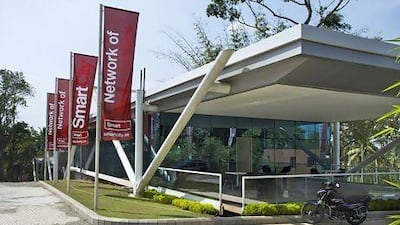KOCHI // In a gleaming office surrounded by lush greenery on the edge of Kochi a handful of staff are at work.
They occupy one corner of a room filled with rows of empty desks. Outside, a worker diligently sweeps a grass verge.
The pavilion, launched last summer, to promote a vast Dubai-owned business park project planned for the port city in the Indian state of Kerala, may be quiet now, but the area is expected to become a hive of activity within the next few months.
The SmartCity Kochi project is set to move ahead after being plagued by years of delays, as it aims to take a slice of a US$300 billion (Dh1.1 trillion) market, according to its owner, Tecom Investments.
The design of SmartCity Kochi is based on Dubai Internet City and Media City. Tecom is in a joint venture with Kerala's government, which holds a 16 per cent stake in the development, while Tecom owns the remaining share.
It is hoping to tap India's burgeoning IT sector, as the Indian government targets a tripling of the industry's revenues to reach $300bn by 2020.
First proposed in 2004, the development has faced a series of setbacks, including opposition, a change in government, land disputes and red tape. The palm-fringed expanse of green land that has been fenced off for the development remains largely untouched, while just opposite, a government-owned technology complex called InfoPark, announced at the same time as SmartCity, has sprung up and houses offices for an array of companies including Wipro and Orion India Systems.
"We are very hopeful that things will move in the right direction without any further delay," said Baju George, the managing director of SmartCity Kochi.
Construction is expected to start on the project within the next five months. The first phase will require investment exceeding 4,000 crore rupees (Dh2.7 billion), which is to be injected by Tecom and core developers. One of these is expected to be Kelachandra Group, a Bangalore companythat has signed an initial agreement to develop 25 to 50 acres of land.
"Once we start construction, the first building will be finished in 18 months," Mr George said.
Phase one involves the development of a 50-acre plot and will include an IT building, some buildings by one of the core developers and essential infrastructure such as roads.
"For the first building, we are in the process of finalising the tender and shortlisting potential contractors," said Mr George, adding that it was most likely to consider Indian developers with international exposure.
As well as IT companies, the development is designed to become a hub for media and finance firms. Hotels, shops, schools and homes are planned as part of the 245-acre project.
The final master plan is "being fine-tuned", Mr George said.
"We are in contact with both kinds of clients," he said. "Now that the master plan is almost complete, we've started discussing with them, saying that these are the blocks available for you and do you need any changes. We are also discussing with the IT companies, international companies to come into our first building."
SmartCity is hoping to attract companies based in the Dubai International Financial Centre (DIFC), which would help with marketing the base to its own clients.
"Many may be interested to put their back office operations in Kerala because of the cost advantage," Mr George said.
The business park is expected to eventually generate more than 90,000 jobs, creating opportunities for Keralites who might otherwise have travelled to the UAE, Europe or other parts of India to find work.
But the environment is challenging. US and European economies remain precarious. India's economic growth has slowed and is expected to hit a decade low during this financial year, which runs until the end of next month.
Ratings agencies last year warned of the risk of a potential downgrade of India's credit rating to junk status. A weak rupee, high inflation and concerns about a lack of clarity on tax issues have contributed to making some foreign investors wary.
But Mr George said that SmartCity is not facing "much difficulty" in generating interest.
As a highly literate and educated state, Kerala is an ideal location, which will help Tecom build its developments in Dubai and Malta, where it is constructing a similar business park, he said
"India is now mature and moving into the high end of the value chain for the knowledge industry," Mr George said.
"For the IT or knowledge industry, the biggest input required is not anything else other than the skill set. This is the first place where we can get trained or trainable skill set at a reasonable cost. That was the main reason why we selected Kochi and Kerala."
Land availability in Kochi was also a factor.
Tecom believes that it has overcome its final hurdle, which was securing a single special economic zone status for the whole project, which was approved only last month.
SmartCity had been fighting to get this approval, which was a challenge because its allocated land is divided into two patches separated by waterways.

